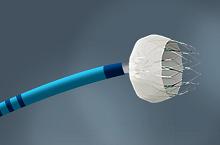
The University of Pittsburgh Medical Center (UPMC) is the first hospital in western Pennsylvania to use the Watchman device (pictured), an implant recently approved by the Food and Drug Administration as an alternative to long-term blood thinner therapy for patients with atrial fibrillation (AFib). Studies have shown that the Watchman device offers these patients as much protection from stroke as blood thinners.
“It’s the most common heart rhythm disorder, and it’s believed that many strokes in the setting of AFib occur due to the formation of blood clots within the heart which then break off and travel to the brain,” said McGowan Institute for Regenerative Medicine affiliated faculty member David Schwartzman, MD, of the UPMC Center for Atrial Fibrillation, part of the UPMC Heart and Vascular Institute, and a Professor of Medicine at the University of Pittsburgh School of Medicine. “The standard treatment to reduce stroke risk is blood thinning using a variety of drugs, but given that they are not selective for the heart, these drugs increase the risk of bleeding elsewhere.”
This new alternative to stroke-risk reduction involves a small device being implanted in the heart rather than medication therapy. The parachute-shaped Watchman is implanted by accessing the heart through a vein in the leg using a non-surgical approach. The device changes the internal shape of the heart, making it resistant to clot formation.
The procedure takes 1 to 2 hours, is painless, and the majority of patients are discharged from the hospital the following day with immediate return to full function. Scar tissue forms around the device over time, permanently closing off the left atrial appendage.
Ralph Bish was one of the first patients to receive a Watchman device at UPMC. The 83-year-old suffered from AFib for many years, and was treated with blood thinners until gastrointestinal bleeding caused recurrent hospitalizations and blood transfusions. This forced him off blood thinners, leaving him at risk for stroke.
“Things were very bleak for me prior to the procedure, and I was very apprehensive about ever getting back to a place in my life where I felt normal,” said Mr. Bish, of Freeport, Pa. “A lot of people who are on blood thinners can’t get off of them, but this device gave me hope. I’m heading in the right direction and hope to improve even further.”
More than 750,000 hospitalizations involving AFib occur each year, according to the Centers for Disease Control and Prevention. The condition also contributes to an estimated 130,000 deaths annually.
“The incidence of AFib rises as people get older, and it’s a huge burden on them that increases their risk of stroke,” noted Raveen Bazaz, M.D., also part of UPMC’s Center for Atrial Fibrillation. “This new therapy can lower the risk of stroke to benefit many patients in western Pennsylvania who are not considered optimal candidates for blood thinners.”
The UPMC Heart and Vascular Institute is one of the world’s premier centers for comprehensive care, developing revolutionary devices and new models of treatment that improve the lives of those facing the most complex heart and vascular conditions. It also houses the Center for Atrial Fibrillation, the first center of its kind in western Pennsylvania dedicated to AFib education, research, and development.
Illustration: Watchman.
Read more…
UPMC/University of Pittsburgh Schools of the Health Sciences Media Relations News Release
